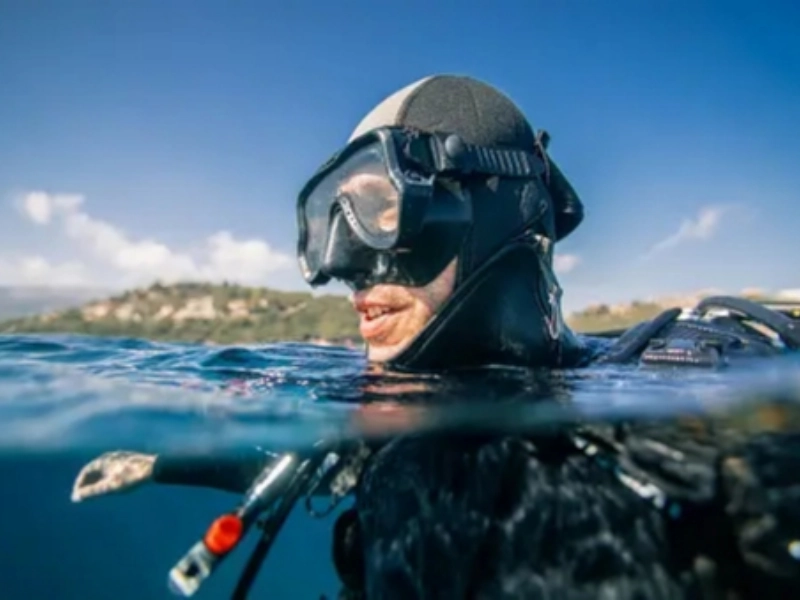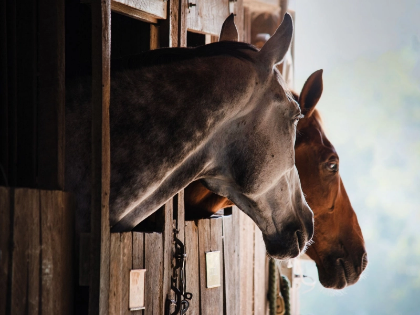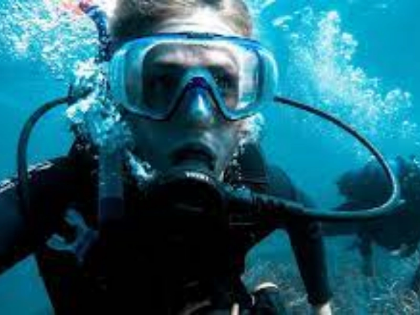Shark Diving: A Secure Way to Face Ocean Predators
You can get up close and personal with some of the most fearsome creatures in the water through the incredible experience of shark diving. Before you enter waters where sharks are present, there are a few things to consider. Keep in mind that sharks are untamed creatures that will react aggressively when they sense danger. Never try to pursue a shark; instead, always respect their space.
Steer clear of bright colours.

Group Swimming
 It is crucial to keep in mind that you are entering a world of predators whether you are swimming in a tropical lagoon to see the magnificent scalloped hammerhead or snorkelling to see the stunning and dangerous great white shark. Given that these amazing animals are highly skilled hunters, it's critical to swim carefully and show respect for them.
It's also crucial to refrain from pursuing animals or attempting to take a “good photo.” Animals may become agitated when people pursue them, which may make them feel threatened and inclined to attack. Chasing marine animals will also probably cause abnormal encounters and disturb their natural behaviour patterns.
Going in smaller groups is the best way to enjoy your shark diving experience safely. Small group dives provide you the chance to form sincere relationships with other divers and exchange breathtaking marine observations, all while strengthening your friendship with your fellow divers. Smaller group numbers also lessen the influence on the fragile marine ecosystem.
It is crucial to keep in mind that you are entering a world of predators whether you are swimming in a tropical lagoon to see the magnificent scalloped hammerhead or snorkelling to see the stunning and dangerous great white shark. Given that these amazing animals are highly skilled hunters, it's critical to swim carefully and show respect for them.
It's also crucial to refrain from pursuing animals or attempting to take a “good photo.” Animals may become agitated when people pursue them, which may make them feel threatened and inclined to attack. Chasing marine animals will also probably cause abnormal encounters and disturb their natural behaviour patterns.
Going in smaller groups is the best way to enjoy your shark diving experience safely. Small group dives provide you the chance to form sincere relationships with other divers and exchange breathtaking marine observations, all while strengthening your friendship with your fellow divers. Smaller group numbers also lessen the influence on the fragile marine ecosystem.
Remain composed.
 Diving offers the opportunity to explore a new environment in addition to the excitement of up-close encounters with sharks. Here, the rules of gravity appear to be altered, colours change with depth, and sea monsters straight out of fantasy books glide by.
It's critical to keep in mind that you are visitors in the homes of the sharks when you dive with them. Though it's better to let them hunt freely and stay as close to the ocean as possible, they don't need to be appeased or tamed (sharks are less worried with taller, vertical humans).
Always remember to breathe steadily and slowly, and to keep your buoyancy under control. Turning around frequently to obtain a full perspective of your surroundings is also beneficial. Most importantly, pay attention to what your guide says and keep an eye on them the entire dive—they are the ones who are familiar with the area and the best ways to interact with the sharks. It's acceptable to quit a dive if you start to feel uneasy.
Diving offers the opportunity to explore a new environment in addition to the excitement of up-close encounters with sharks. Here, the rules of gravity appear to be altered, colours change with depth, and sea monsters straight out of fantasy books glide by.
It's critical to keep in mind that you are visitors in the homes of the sharks when you dive with them. Though it's better to let them hunt freely and stay as close to the ocean as possible, they don't need to be appeased or tamed (sharks are less worried with taller, vertical humans).
Always remember to breathe steadily and slowly, and to keep your buoyancy under control. Turning around frequently to obtain a full perspective of your surroundings is also beneficial. Most importantly, pay attention to what your guide says and keep an eye on them the entire dive—they are the ones who are familiar with the area and the best ways to interact with the sharks. It's acceptable to quit a dive if you start to feel uneasy.
Avoid Chasing
 When they come to dive sites, sharks are curious, not hostile, animals. Their prey and environment typically have an impact on their behaviour. Divers should, however, refrain from pursuing them. If you pursue a shark, it will perceive that you are on a level playing field, which may lead to defensive reactions. Your body temperature, chemical imbalance, and adrenaline levels will also increase if your arms and legs flail, which will make the shark react even more.
Rather than chasing after the shark, give it space and let it alone. Keep in mind that sharks are searching the surface for dead or injured creatures, not people. Steer clear of lengthy surface swims as well. You'll spend less time on the surface and be safer if you use stairs or a seated entrance.
Even though sharks are known to be dangerous, your chances of being attacked by one are significantly smaller than your chances of winning the lottery. You may enjoy your shark diving experience while respecting the sharks and preserving their natural habitat by paying attention to these easy pointers.
When they come to dive sites, sharks are curious, not hostile, animals. Their prey and environment typically have an impact on their behaviour. Divers should, however, refrain from pursuing them. If you pursue a shark, it will perceive that you are on a level playing field, which may lead to defensive reactions. Your body temperature, chemical imbalance, and adrenaline levels will also increase if your arms and legs flail, which will make the shark react even more.
Rather than chasing after the shark, give it space and let it alone. Keep in mind that sharks are searching the surface for dead or injured creatures, not people. Steer clear of lengthy surface swims as well. You'll spend less time on the surface and be safer if you use stairs or a seated entrance.
Even though sharks are known to be dangerous, your chances of being attacked by one are significantly smaller than your chances of winning the lottery. You may enjoy your shark diving experience while respecting the sharks and preserving their natural habitat by paying attention to these easy pointers.









